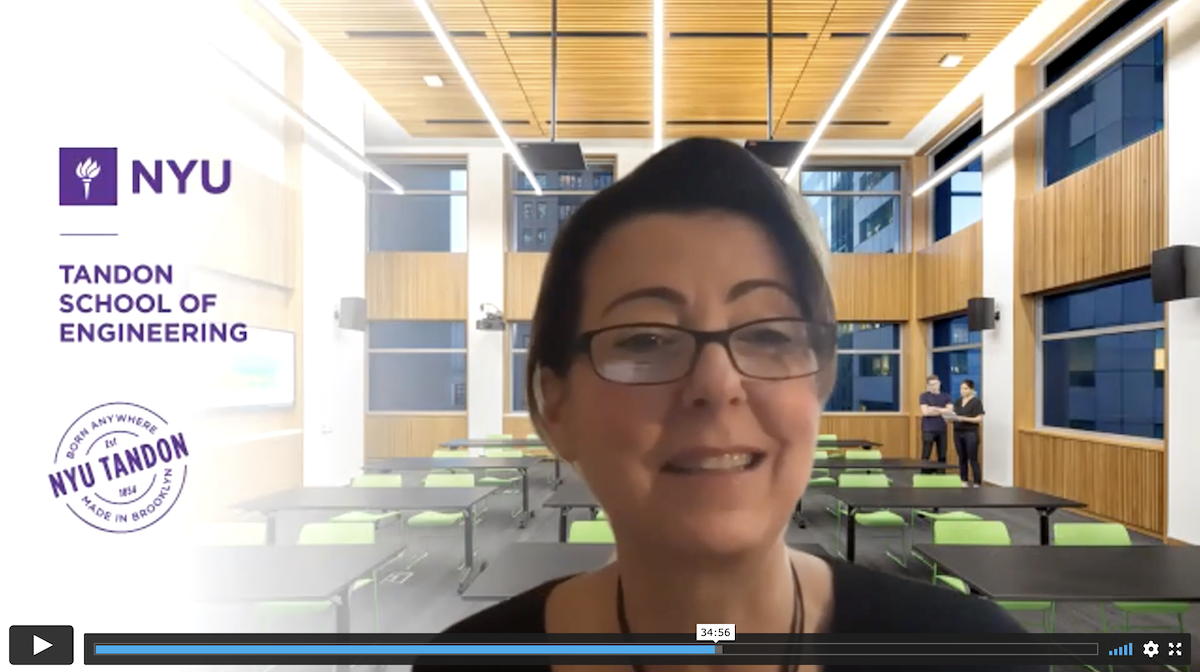Dean Jelena Kovačević helps kick off a new series with the Downtown Brooklyn Partnership

Dean Jelena Kovačević is used to stepping up and being first. She is, for example, the first woman to head the NYU Tandon School of Engineering since its founding in 1854, and she was also responsible for launching the Northeast Regional Deans (NeRDs) council, having seen a need for engineering school leaders to support and advise one another early on in her tenure--and efficiently acting upon that need.
On November 12 she helped launch another initiative: the Make It in Brooklyn/Meet the Founders series, sponsored by the Downtown Brooklyn Partnership (DBP), where she is Board Co-chair. The first installment of the live-streamed series featured a discussion between Kovačević and Will Canine, co-founder and chief product officer of Brooklyn-based biotech startup Opentrons, makers of a robotic lab assistant.
“It was so much fun chatting with Will,” Dean Jelena said, “and I’m looking forward to seeing which founder will be featured next. We have a saying at Tandon that you can be born anywhere, and made in Brooklyn, and the Downtown Brooklyn Partnership is really highlighting that sentiment with this new series.”
“Launching a series like this during the COVID-9 Pandemic is a demonstration that Downtown Brooklyn continues to thrive and is home to the ever-growing innovation economy,” said Regina Myer, president of the DBP. “I was thrilled to have Dean Kovačević — who is both our Co-chair and leader of the Tandon School of Engineering — kick off the series, and we look forward to constantly highlighting companies like Opentrons throughout.”
This pairing was a comfortable one — Canine shared that he is an alum of NYU Tisch ITP — and pleasantries exchanged, the two dove into a lively Q&A that illustrated Canine’s journey as an entrepreneur and what makes Brooklyn a tech and innovation capital.
Dean Jelena: What did you see in the biotech field that spurred you to found Opentrons?
Will Canine: In my case, it was working as a master’s student at Genspace that sparked my idea for the business. Genspace is an open-access lab that invites members of the public to conduct hands-on experiments and develop applications relevant to their own lives. I loved the atmosphere of intellectual curiosity and community engagement but disliked some of the repetitive tasks that went into iterating a successful scientific process. I found myself wondering why scientists should be stuck doing that kind of tedious benchwork when they could be spending their time designing experiments and analyzing data. Why couldn't it be automated, like 3D printing is?”
Dean Jelena: What are some key moments that helped shape and define the company?
Will Canine: Definitely meeting the right co-founder, Chiu Chau, who had more than 20 years of experience in the biotechnology field.
Dean Jelena: I know that you originally considered a career in community organizing or political campaigning. As the dean of an engineering school that has developed a program called Bridge to Tandon, which provides the skills and knowledge for non-STEM bachelor’s degree holders to become qualified to earn a master’s degree in a technical field like cybersecurity or bioinformatics, I am extremely interested in knowing why you chose to to make such a pivot yourself.
Will Canine: I believed that biotechnology could be a more immediate and impactful way of changing the world, and I knew that creating a robotic system capable of cherry-picking, performing automated serial dilutions, concentration normalization, and many of the other monotonous but vital tasks biologists must complete while running their experiments would free them up to spend more time finding answers to some of the 21st century’s most important questions. We think of ourselves as a missionary company, not a mercenary one.
Dean Jelena: I know we have something else in common. Earlier this year, when the pandemic hit New York, a group of Tandon staff, faculty, and students designed an affordable way to produce face shields, when personal protective equipment was in short supply. We open sourced that design and to date more than two million face shields have been created based on or adapted from it. Opentrons also has a strong open-source ethos. How does this approach help advance scientific discovery?
Will Canine: We provide our clients in the scientific community with a platform to share protocols and results. That encourages collaboration: once a user has run their protocol, they can replicate or adjust it as needed, and it can then be shared a number of ways: with labmates or even other labs using the robot, with the broader scientific community through our open-source Protocol Library, or in publications, which encourages reproducibility. The open-source movement has been responsible for a lot of innovation in the last few decades, and we’re happy to be facilitating that.
Watch the full video
To find out more about future Meet the Founders events, visit Downtown Brooklyn Partnership.



